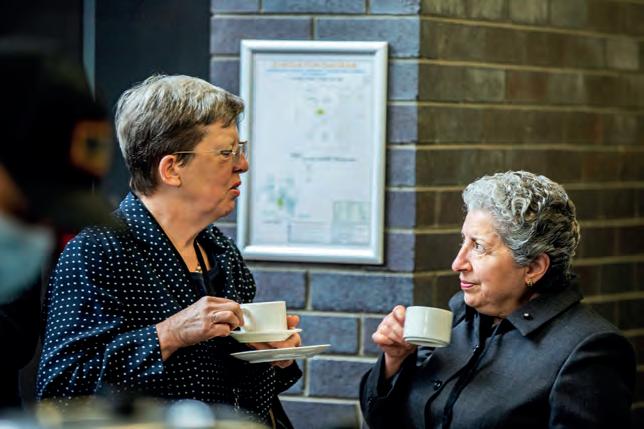
11 minute read
FAITH AND SERVICE Blueprint for
On 26 June 2021, members descended upon the Australian Catholic University Melbourne campus for the 2021 Biennial National Assembly. The theme for the occasion was inspired by a reflection shared by the Most Reverend Bishop Terence Curtin at the February Subpriory retreat. ‘Companions on a journey’ – in reference to the parable of the good Samaritan (Luke 10:25-37) – “When the Samaritan saw him he was moved with pity.” There was our call and our inspiration as we turned to God and each other at this National Assembly. We see what we are being asked to do and to be, and how we might come to it.
Because this was our first assembly conducted during a pandemic, we took steps to ensure those regions locked down or locked out of Victoria were able to take part. We organised live video with groups in the North Eastern and Central Eastern Regions at their respective ACU campuses, so they could take part in the presentations and their working groups.
The event was opened by a video message from our Grand Chancellor, H.E Albrecht Freiherr von Boeselager and our Grand Hospitaller, H.E Dominique Prince de la Rochefoucauld-Montbel. In reference to the COVID-19 pandemic, our theme of ‘Companions on a Journey’ was applauded and embraced by the Grand Magistry in reference to our renewal and commitment in service of others.
Theme One: Introducing the Working Strategy
Our National President, the Hon. James Douglas, introduced the main agenda of the Assembly which was the launch of the working strategy. He and the Executive Council had overseen creating the strategy in the preceding 18 months, formulated with the help of leading consultants and the input from nationwide member surveys and discussions at the previous Asia Pacific Conference. This was, once again, another opportunity for members to give their vital input into the areas of: works of the Order, spiritual growth, defending the faith, growing membership and ensuring governance.
“Our charisms, defense of the faith and service to the sick and the poor, drive what we do as a religious order of lay Catholics in strengthening our own faith and serving the poor,” he said. “As our late Grand Master, Fra’ Giacomo said: ‘Strengthening the faith of each of us is an extremely important element in the Order of Malta. How can we put into practice the charism of Tuito Fidei and consequently, that of Obsequium Pauperum, if we do not keep our faith
Our Values
Drawing on the traditions and daily prayer of the Order of Malta, our members strive to live their faith with humility, service, courage and in fraternity with one another.
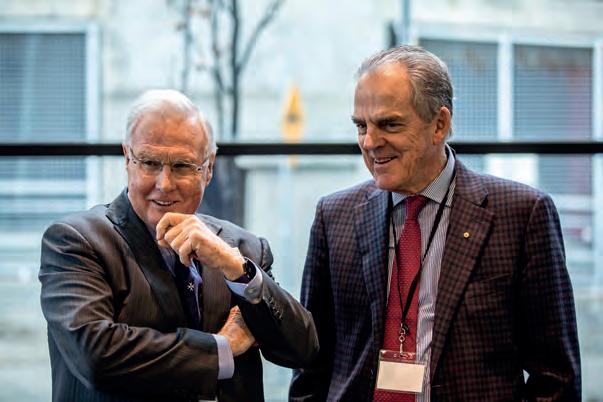
alive and strong within us?”
Considering that the Assembly was held during a time of renewal and COVID related lockdowns, it was appropriate that the National Hospitaller John Murphy KMG launched Theme One: ‘Growing our Services’. The Order in Australia and New Zealand had been without many of our traditional programs of works due to regional COVID restrictions. The assembly was the first opportunity for the Order to relaunch ‘hands on’ activities and works of the Order.

During the meeting we discussed that, as a lay religious Order, the Order of Malta exists to provide opportunities for our members and volunteers to attain Holiness through ‘hands on’ work by serving our Lords the sick and the poor. Growing our services is critical to ensure we provide a range of programs that allows our members to become directly involved and engaged in serving others.
Strategy 1A- Increase assistance to the Homeless. The Order’s Coats for the Homeless program has been our signature program for more than a decade. Every winter, we see the program make a real difference to those sleeping rough in our major cities in Australia and New Zealand. How do we ensure this program remains relevant and effective into the future? Can we expand our offering? What needs are not being met in caring for the homeless?
We have done this through several methods. One is striving to have community care vans in all regions. Another is an expanded ‘hands on’ focus in distributing Coats for the Homeless. We are working towards increasing the level of personal distribution of coats in all regions where possible and practical. We will increase the number of members and volunteers directly encountering the homeless and serving our Lords the sick and the poor. This is where we recognise in them the person of Christ. Members need to experience this more regularly.
We are also working to provide personal care packs all year round. In addition to this regular contact, we are aiming to establish partnerships with Catholic health providers and Catholic academic institutions as increasingly important alliances for the Order.
Strategy 1B- Develop an Order of Malta national program of palliative care involving members and volunteers.
We are called to care for the poor and sick and to defend the faith by protecting the sanctity of life, especially today in countering the societal pressure for assisted suicide. Palliative care has been identified as a major area of focus for the Order.
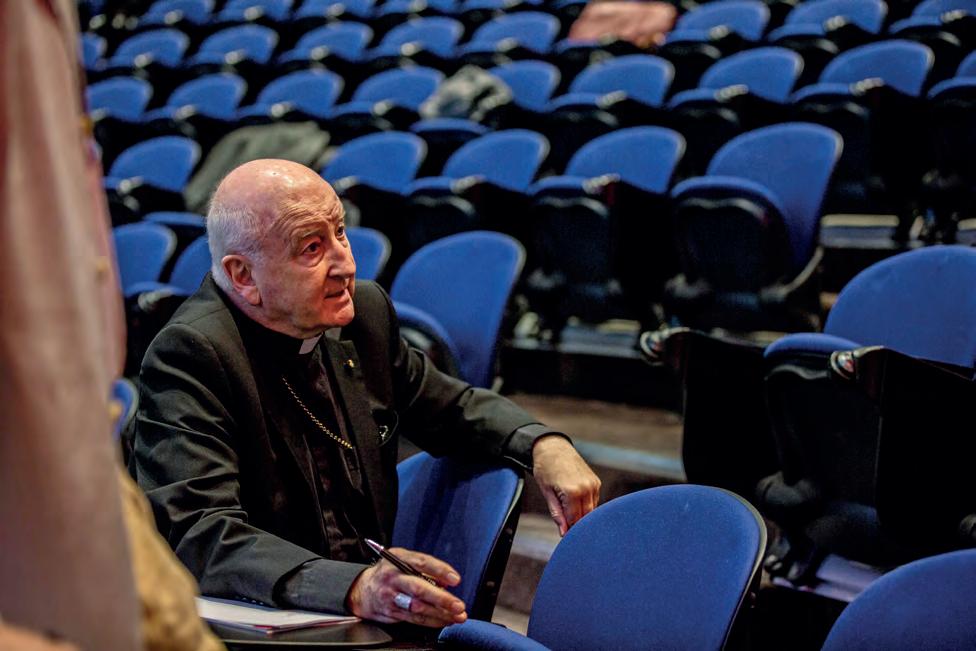
We are particularly called to provide living witness through example. We will work to support palliative care services in their support for people with life limiting illnesses. We will strengthen palliative care delivery through our members and volunteers by working closely with existing Catholic agencies and developing our own capacity in this area.
Our goal is to become the leading volunteer-based organisation offering palliative care services nationally, with a focus on ‘hands on’ programs run by members and volunteers.
Strategy 1C- Provide local and regional disaster relief
In Australia and surrounding Pacific nations, the Australia and New Zealand associations/delegations have been able to deliver targeted assistance to many individuals, families and parishes in areas ravaged by natural disasters.
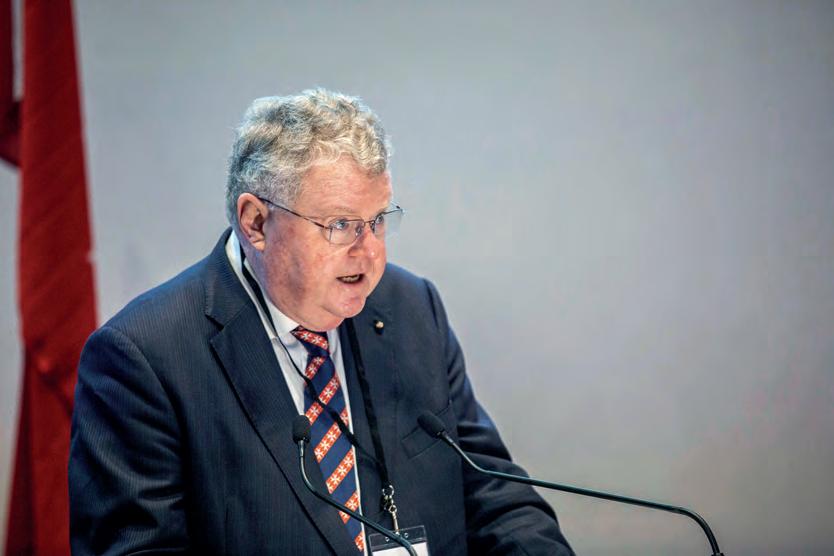

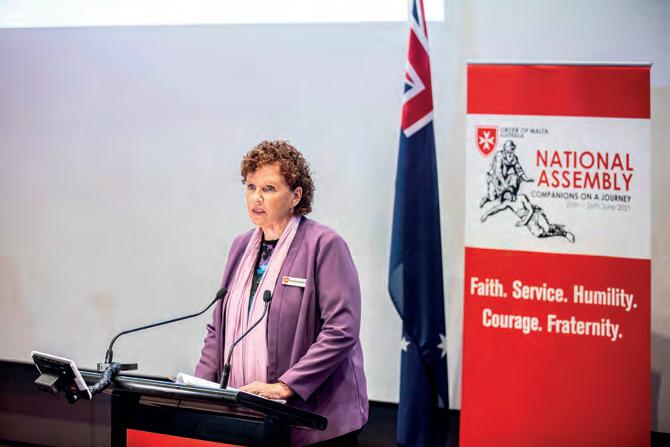
Recent examples of our work include assistance to communities affected by bushfire in New South Wales and Victoria, and flood victims in Timor-Leste.
We will continue to develop our capacity to raise funds and deliver unique and targeted assistance to those requiring both immediate assistance and, in many cases, longer lasting programs. Strategy 1D- Expand the range of services to the poor and the sick.
For the past 18 months national and regional leadership have looked at various opportunities and projects big and small. Some continue to progress close to launch as they undergo the scrutiny of our newly formed Finance, Audit and Risk Committee. Several of these could expand to additional regions once they are established.
These projects include: the Order of Malta Community Care Kitchen-Central Eastern Region, Flexible Aged Care Facility for Indigenous-North
Central region, Community Care Centre North Eastern region; and Australian Catholic University and Order of Malta Community Hub.
At the meeting we shared these high-level objectives, and discussed how we must now coordinate national signature programs in a united approach across regions. We also called on the local regions to create unique initiatives suited to fulfil the needs at a local level. The approach of all regions working on isolated sites is to now evolve into an environment of collaboration and shared learning and support across regional lines.
Theme Two: Growing our Members and Volunteers
The second theme for the day was growing our membership and volunteers with the high-level objective: by 2024 we will have an active and diverse membership that embraces the values and spiritual commitment of the Order of Malta. Presented by our National Treasurer, James Gurry, we were taken through the development of the newly formed Order of Malta Volunteers and the newly strategic thinking behind growing our membership.
Our current Australian membership stands at 305. This includes 32 new chaplains as well as the new Order of Malta Volunteer corps of approximately 100 members and growing.

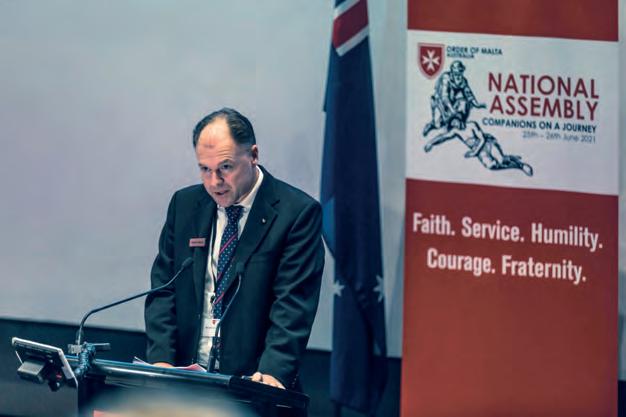
At the meeting we discussed how a diverse membership will give a wider variety of strengths. This will be represented by way of age, gender, background, ethnicity, skill and talents, and different perspectives.
In the past, some may have seen admission to the Order as merely an honour, an award or recognition for their standing in Catholic society. During the meeting we discussed that, as we know, there is much more to membership. In fact, membership is an opportunity to serve and do more work as we carry out our mission. The Order is focused on offering opportunities for members of all ages and abilities to remain active and engaged within the Order. Our works range from direct ‘hands on’ outreach to private spirituals works depending on our capacity and capability.
At the meeting we shared high-level objectives including increasing assistance to the homeless, providing local and regional disaster relief, and expanding our range of services to the poor and the sick. We discussed how we must now coordinate national signature programs in a united approach across regions.
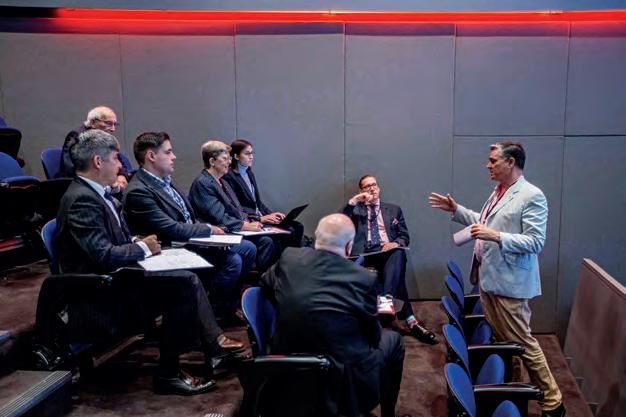
Our future lies in people – members (including chaplains), candidates and volunteers.
Strategy 3.A-Grow Membership with a goal of 350 members by 2024 Quality candidates that meet the set criteria of the Order, and are committed to our charism, are essential for a healthy organisation. But quantity is also important if we want to make an impact, grow our influence, and make a measurable difference in our society.
With the recent statute reform, there is an enhanced platform to increase our profile among Catholic businesses, professional groups, universities, communities and parishes, to attract committed Catholic men and women of all ages and backgrounds.
The new member formation policies and workbook are world-best practice. They are now being used by the Grand Magistry and circulated to other associations as the master policy document.
Strategy 3.B- Create and manage a strong volunteer force
Volunteers have a strong tradition in the Order and have played an important role in assisting with the delivery of services and programs. Many associations in our global order have a ratio of six volunteers to one member. Some in our region have a ratio of 10-1.
The Australian Association has now made volunteers a strategic priority and has begun by commencing the development of Order of Malta Volunteers (OMV), consisting of individuals between 18 to 35 years of age.
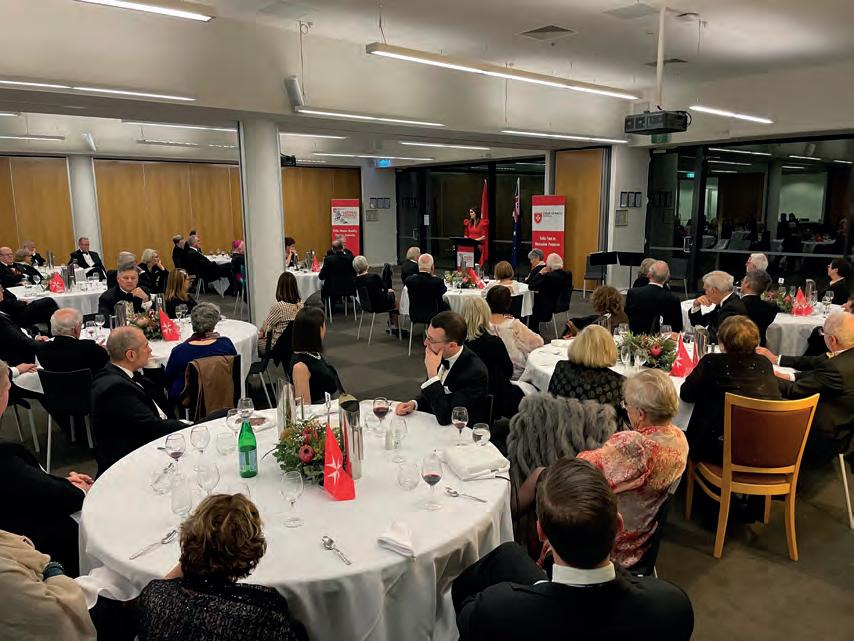
Our goals are now to grow OMV to manage and develop volunteer activities. We are also looking to establish strong OMV leadership and representation in each region, as well as develop relationships with Catholic universities, theological colleges, secondary schools and parishes for the purpose of attracting young volunteers, and building a pipeline for future members. We are also hoping to attract Catholic health science students to volunteer by offering scholarships.
Theme Three: Defending the Faith National Vice President Michelle Campbell introduced the third theme for the day “Defending the faith”. In this theme we discussed how we will be providing timely and credible responses to contemporary threats to the Catholic faith.
In addition to the Daily Prayer of the Order, each Knight and Dame – at his or her investiture –promises to “always bear witness to the Catholic faith, to defend the Church, and to lead my life in accordance with the teachings of Holy Mother Church.”
The Regulations and Commentary (R&C) of the Order declare: “The witness and protection of the faith remain incomplete without the devotion of God’s poor” (p. 37). Our service to the sick and the poor is one kind of witness. The witness of Tuitio Fidei is another kind of witness. It is a declaration of faith and a “call to arms” although (in modern times) not literally. The charism of Defense of the Faith relates more closely to the historical military aspect of our vocation than the charism of Obsequium Pauperum. That is not to say that it does not exist, especially when, as now, the Church is under coordinated and relentless assault.
When we defend the Faith, we defend the defenseless with our eyes on the poor and the sick.
Strategy 2.A Develop protocols and capability for Defense of Faith responses to threats to the Catholic Faith.
A “flexible” panel of Defense of Faith experts drawn from members has been active since late 2017. They have produced several advisories to arm members with information, and point them to actions that may be taken as individuals. The issues covered include the seal of confession, religious freedom and assisted suicide, and are available on our website.
The panel will be strengthened with members and chaplains invited or recruited to join on a long-term or ad-hoc basis. They will work on developing further advisories in response to the flow of attacks on the faith, and proactively as practicable.
We aim to educate, prepare and inspire members to take personal action on threats to the Catholic faith and to visibly live their life consistent with the doctrines of the Roman Catholic faith. Additional to Order-generated advisories, materials from other Catholic entities will be sourced for members to build on.
Theme Four: Supporting Spiritual Growth
The final theme for the assembly was supporting spiritual growth, presented by Professor David Kissane AC KMG (Ob) - Regent, Subpriory of the Immaculate Conception.
The high-level objective for 2024 was that members will regard the Order as their new primary means for sanctification and support for their response to Our Lord’s call to be holy.
Members of a religious Order must naturally see it to be their spiritual home within which they can actively seek and glorify God and advance in holiness. In fact: “members are obliged to work on and deepen their spiritual life continuously” (Regulations and Commentary, Ch 5).
Within the Order is a rich environment supporting every member’s spiritual growth and lifelong formation. This was given a reboot in early 2020 when a common formation program for candidates was initiated across all regions. Since then, other spirituality activities have been increased in all regions.
Strategy 5.A- Create and maintain environment to support lifelong formation
Strategy 5.B- Use print and digital media to promote and support lifelong formation
These two strategies have intersected and are not mutually exclusive.
Spiritual activities across all regions have progressively increased, with chaplains becoming more engaged in the Order’s liturgical life and the formation of candidates and members. These developments are now prominently aided by publications and digital platforms.
The annual calendar of Masses, retreats, and reflection days has been enriched to encourage and support ongoing formation in the Catholic Faith. Members can now avail themselves of more opportunities to deepen faith and worship.
In addition to the availability of calendared spiritual activities, members are supported in their personal, ongoing, lifelong formation in a number of ways:
One of those way is a book Becoming Holy: The Landscape of Formation that helps members in their response to the call to holiness which was produced and distributed to all members this year.
Another initiative was a national formation team, comprising two chaplains and two members. It’s a place that will oversee the implementation of the global “Spiritual Renewal” strategy as it evolves.
We have organised assistance for individual members to obtain guidance from qualified spiritual directors, the preference being our Chaplains.
Additionally we have sought to mobilise members in Obedience to provide spiritual accompaniment to other members.
Digital technologies have helped us along this path with a few initiatives. This includes the series of web talks “An hour of reflection with a Chaplain” which was initiated in July 2021. The series has been enthusiastically accepted by members and will be a fixture in our national calendar.
We have also launched two online Rosary groups – candidates and their supporters; and our volunteer community has evolved into monthly Rosary for all our members, their families and friends. This is a great consequence of the COVID-19 driven environment.
Across all of our channels communications, we aim to place Spiritual content, to support this important theme.
The assembly finished off on the high-level objective that by 2024 members will regard the Order as their new primary means for sanctification and support for their response to Our Lord’s call to be holy.











